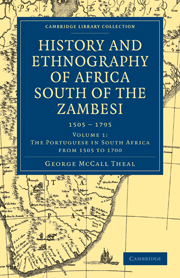Book contents
- Frontmatter
- PREFACE
- Contents
- MAPS AND PLATES
- CHAPTER I THE BUSHMEN
- CHAPTER II THE HOTTENTOTS
- CHAPTER III THE BANTU
- CHAPTER IV DESCRIPTION OF THE BANTU—(continued)
- CHAPTER V DESCRIPTION OF THE BANTU—(continued)
- CHAPTER VI SPECIMENS OF BANTU FOLKLORE
- CHAPTER VII DESCRIPTION OF THE BANTU—(continued)
- CHAPTER VIII ARAB AND PERSIAN SETTLEMENTS IN SOUTH-EASTERN AFRICA
- CHAPTER IX DISCOVERY OF AN OCEAN ROUTE TO INDIA
- CHAPTER X SUCCEEDING VOYAGES AND CONQUESTS
- CHAPTER XI OCCUPATION OF SOFALA AND MOZAMBIQUE
- CHAPTER XII INTERCOURSE OF THE PORTUGUESE WITH THE BANTU
- CHAPTER XIII DISASTROUS EXPEDITIONS UNDER BARRETO AND HOMEM
- CHAPTER XIV EVENTS TO THE CLOSE OF THE SIXTEENTH CENTURY
- CHAPTER XV KNOWLEDGE DERIVED FROM SHIPWRECKS
- CHAPTER XIV APPEARANCE OF RIVALS IN THE EASTERN SEAS
- CHAPTER XVII PROCEEDINGS OF THE DUTCH AND ENGLISH
- CHAPTER XVIII FRUITLESS SEARCH FOR SILVER MINES
- CHAPTER XIX EVENTS OF INTEREST FROM 1628 TO 1652
- CHAPTER XX WEAKNESS OF PORTUGUESE RULE IN SOUTH AFRICA
- Plate section
CHAPTER IX - DISCOVERY OF AN OCEAN ROUTE TO INDIA
Published online by Cambridge University Press: 05 August 2011
- Frontmatter
- PREFACE
- Contents
- MAPS AND PLATES
- CHAPTER I THE BUSHMEN
- CHAPTER II THE HOTTENTOTS
- CHAPTER III THE BANTU
- CHAPTER IV DESCRIPTION OF THE BANTU—(continued)
- CHAPTER V DESCRIPTION OF THE BANTU—(continued)
- CHAPTER VI SPECIMENS OF BANTU FOLKLORE
- CHAPTER VII DESCRIPTION OF THE BANTU—(continued)
- CHAPTER VIII ARAB AND PERSIAN SETTLEMENTS IN SOUTH-EASTERN AFRICA
- CHAPTER IX DISCOVERY OF AN OCEAN ROUTE TO INDIA
- CHAPTER X SUCCEEDING VOYAGES AND CONQUESTS
- CHAPTER XI OCCUPATION OF SOFALA AND MOZAMBIQUE
- CHAPTER XII INTERCOURSE OF THE PORTUGUESE WITH THE BANTU
- CHAPTER XIII DISASTROUS EXPEDITIONS UNDER BARRETO AND HOMEM
- CHAPTER XIV EVENTS TO THE CLOSE OF THE SIXTEENTH CENTURY
- CHAPTER XV KNOWLEDGE DERIVED FROM SHIPWRECKS
- CHAPTER XIV APPEARANCE OF RIVALS IN THE EASTERN SEAS
- CHAPTER XVII PROCEEDINGS OF THE DUTCH AND ENGLISH
- CHAPTER XVIII FRUITLESS SEARCH FOR SILVER MINES
- CHAPTER XIX EVENTS OF INTEREST FROM 1628 TO 1652
- CHAPTER XX WEAKNESS OF PORTUGUESE RULE IN SOUTH AFRICA
- Plate section
Summary
The discovery of an ocean route from Europe to India, followed by the establishment of the Portuguese as the preponderating power in the East, is one of the greatest events in the history of the world. It is not too much to say that every state of Central and Western Europe was affected by it. The time was critical, for the Turks were then menacing Christendom, and if they had secured a monopoly of the Indian trade their wealth and strength would have been so augmented that it is doubtful whether they might not have succeeded in entering Vienna in 1529. As yet the Moslem power was divided, for Egypt was still under the Mameluke rulers, and the greater portion of the Indian products that found their way to Europe was obtained by the Venetians at Alexandria. To that city they were conveyed in boats down the Nile from Cairo, after being carried by camels from the shore of the Red sea, whither they were brought by ships from the coast of Malabar. From this traffic Alexandria had thriven greatly, and from it too Venice,—whose citizens distributed over Europe the silk and cotton fabrics, pepper, and spices of the East,—had become wealthy and powerful. That portion of the Indian merchandise which was brought overland by caravans from the Persian gulf to the Mediterranean coast was under the control of the Turks, and a few years later, when in 1517 the sultan Selim overthrew the Mamelukes and made Egypt a province of his dominions, the whole would have been theirs if the Portuguese had not just in time forestalled them.
- Type
- Chapter
- Information
- Publisher: Cambridge University PressPrint publication year: 2010First published in: 1907

